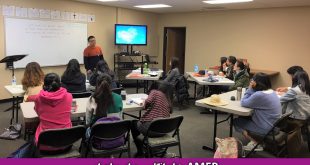In this episode of Walking With Pete I talk to you guys about two introduced pest species in Australia, rabbits and foxes, as well as the unrealistic language learning expectations many English natives tell me they have when I ask them why they don’t learn a foreign language.
Walking With Pete: Rabbits, Foxes & Unrealistic Language Learning Expectations
G’day guys and welcome to this episode of Aussie English. Today I’m out in the park standing in a bit of a, sort of, a ditch. Not a ditch, but a big sort of drop in the land to try and get a little cover from the… from the wind. There’s a whole heap of wind today, and I wanted to go out for a walk but um… realised I couldn’t really record very well without getting a whole heap of “shhhh” kind of sound in the background whilst trying to record the episode. So, I found a little hidden away um… area that kind of dips down away from the wind next to the hospital. So, it’s acting as a windbreak. And, I thought I’d come and stand near these trees where there were a lot of lorikeets but as soon as I started recording the episode they just flew off. So, you’re not going to hear them squeaking in the background unfortunately. But there’s a whole heap of animals here at the moment. There’s a whole heap of magpies and some other birds sitting on the ground, look for worms and other insects, other animals. And there was also a rabbit just running around, which is kind of weird. You don’t really see rabbits around in Australia during the day. They’re an introduced pest species. So, I think they’re a massive massive problem, or at least they were a massive massive problem in the past, especially for farmers because they would… they would dig up a lot of areas and make what are called “rabbit warrens”, and a rabbit warren is the… it’s the name that um… we give their little homes that they create like mounds of dirt full of holes, like dig… they dig burrows in the ground, and that’s a warren. They create the warrens to live in. And so, yeah. Rabbits are a massive problem here in Australia and they’re out of control. And partly… part of the problem is that Australia cleared a lot of land in the last century or two centuries, the last 200 years. We’ve cleared a lot of land to create ah… grazing areas. So, areas and fields for… for animals, domesticated animals as well as farm animals, to live on and for us to grow them and farm them on, especially cows and sheep. They’re two of the biggest um… probably two of the biggest… Hopefully you can hear this magpie singing. Bit of wind. This male magpie has come right down next to me and is singing in the background. Um… yeah so we have a lot of cows and sheep. They’re probably two of the largest um… livestock animals that are farmed here in Australia. And… two other birds fighting. And because we’ve cleared so much land to grow these animals on, to graze them on, so that there’s a lot of grass for them to eat, as a result of doing this there’s a lot of land for rabbits to dig up and turn into warrens. And so, they’ve… they’ve sort of exploded in numbers as soon as they were introduced here by the English when they first arrived in Australia as a food source. So, the English brought the rabbits here and let them go as a source of food. So, that they could go and hunt the rabbits, and then bring them back and eat them. And as a result the rabbits soon, you know, spread across the entire continent of Australia and became a massive pest species, because not only did they sort of follow the farm land that was cleared, and then, you know, do really well on the farm land that was clear, but they also… they also pushed a lot of other species that were in that same niche. So, other species that dug burrows. The rabbits would sort of take that… that niche, that area, and push out native species. So, a lot of other native species had to either, you know, were displaced. They had to move and find other homes, and eventually ran out of homes to find. Or yeah, they were just directly outcompeted. And another problem was that foxes were also introduced about the same time. Foxes are the… they Australian ah… introduced fox species is the um… I think it’s just that red fox that you get from Europe. And that was introduced, again, from England, from Europe, as a species for us to hunt. So, they have fox hunts in the UK still, I think, today where they get on horses and they have hounds, and they, you know, let a fox go or they just go and hunt a fox and find one and then kill it. They did that here in Australia but as a result, just like the rabbits, the foxes just went off and, you know, escaped into the wild, went and bred, and pretty much took over the entire continent. So, we have not only a massive rabbit issue here in Australia as an introduced pest species that does a lot of damage to the land, but we also have a massive problem with introduced foxes, and um… The problem with foxes is that they kill off, as well, a lot of native species giving rabbits um… you know, an open niche to fill. So, they were… the rabbits were no longer competing with native Australian species that foxes were killing, um… and yeah the foxes were also hunting the rabbits. So, there’s this massive problem in Australia with introduced species. That’s you’re, you know, few minute little introduction to rabbits and foxes in Australia. Anyway, rabbits are normally nocturnal. We mostly see them at night on the roads and out and about, and it’s pretty pretty rare to see them during the day. So, that’s why I was shocked when I walked down here and there were a few rabbits um… chilling out underneath a uh… underneath a little bridge here eating grass. Um… and it’s like 2 o’clock in the afternoon. So I was pretty surprised.
Anyway, today one of the things I wanted to cover and chat to you guys about was the misconception that I think a lot of adults have with regards to language learning and how difficult it is at a… at an older age. So, one of the things that most people tell me when I ask them, especially other Australians, why you haven’t learnt another language, or what’s preventing you from learning another language? A lot of the time they tell me that it’s only young people, it’s only babies, it’s only very young children that are gifted at learning languages, and once you get to a certain age, you know, 20, 30, 40, whatever age they state, they normally say that it’s just too hard, you know. We don’t have the memory for it. We won’t be able to remember grammar rules or vocabulary. And I think… I think that’s a real misconception. I don’t think that… I don’t think we’re… we’re worse than children at learning languages. In fact, I would argue that we could be better, considered better, than learning languages than children in certain ways. Because one, children don’t have another language, when they’re learning their first language, to compare that language they’re learning to. So for instance, if you’re learning Australian English and you speak another language like French or Portuguese you get to learn English in the… in the context of your native language. So, you don’t have to learn from scratch what a language is, how a language works, what grammar is, how grammar works. And there’s often going to be quite a few similarities between the languages and, you know, I can’t imagine ever learning a foreign language and not comparing it to your native language as you learn it, and I imagine that it’s a big help to be able to compare your native language to the language you’re learning, you know. If… if not just that so much in so as to, learn the grammar but also because there’s going to be a lot of words and other things that are similar, if not the same, in languages. Granted that it would depend on the languages you’re learning. You know. If you’re learning English and you already speak German there’re going to be a lot of similarities, whereas, if you speak Chinese and you’re learning English then there’s undoubtedly going to be very few similarities in comparison. But also I think people have a misconception with regards to learning vocabulary, and they have an unrealistic expectation that they’ll learn a word once and they’ll remember it. And I think… I think this is garbage. I don’t think are like this. I don’t think adults are like this. The human brain doesn’t work like that. I think if you… if you want to learn something and you want to be able to remember something, you effectively have to prove to your brain, you have to show your brain that it’s worth remembering. And by learning it once that is not enough for your brain to say, “OK, this is important and I need to remember this thing forever, or at least for a long period of time.” It’s just like names. I feel like if you go to a party and you try and learn everyone’s names there and then, no matter how important the people are if you only learn, if you only hear their name once it’s very unlikely that you’re going to remember the person’s name. At least, this is what I’m like, you know, in my experience it’s very difficult for me to remember someone’s name until I’ve met them a few times or heard their name repeated a few times, or said it to myself a few times, I’m not likely to remember it. And I feel like it is exactly the same with languages. You have to keep exposing yourself to the things that you want to learn again and again and again in order to effectively prove to your brain, prove to your… to your mind that the thing that you’re trying to learn is worth remembering. You have to show your brain that this is important. I’m going to use this on a daily basis, on a weekly basis. It’s information that I need to know. And, if our brains didn’t work this way, you know, we would remember every single little bit, every single piece of information that ever went into our heads. And, I think that would be a nightmare, you know, imagine. People with photographic memories don’t often talk about the fact that they have a photographic memory as being a very pleasant thing particularly when it comes to things they see or things they hear. All those kinds of things that you want to forget you don’t have the ability to forget. And I think that what the brain is useful… the brain is good in that respect because anything that isn’t useful it turfs. It deletes. It’s kind of like your computer removing any files that you didn’t use within the last week. So, you’ve got to keep proving, say, to your computer that you’re… the only files the computer’s going to keep are going to be the ones that you use, and every other file on your computer that you don’t use within a certain period of time it just erases. Those kinds of computers would be probably a lot more efficient, or at least a lot more useful, and in terms of me at least, because I know I build up a lot of garbage on there and take up a lot of space, and then I have to go through and remove, you know, large swathes of files and movies and all sorts of things that I’ve saved. So, our brains are kind of like that where we only save the things that are really important, you know. Brain space is important, and it’s a lot better for us to only keep the things that really matter, that we’re going to use, that we need, than to keep every single little thing that we ever walk past, that we ever see, that we ever hear, that we ever talk about. And so, I feel like that’s the thing. Coming back to adults and learning languages, part of the reason people think language learning is so difficult is because they have an unrealistic expectation that when you’re an adult you should be able to remember, you should be able to learn things, you should be able to do things at sort of an expert level right from the get go. Right from the start, you know. There’s no… there should be no process of learning, effectively. I feel like a lot of people have… they should… they feel like they need to get things straight away. And, it’s just not the case. I think a lot of adults forget what it’s like being a child, you know. When you’re a child you are learning everything. There’s nothing that you’ve mastered, you know. Especially under the age of 10. You’re learning every single thing that you come up against, that you… you try and do whether it’s learning languages, riding bikes, learning math, learning to walk or run. All of those things you have to learn. And so, I think children just have the expectation that they’re not going to be good at anything as soon as they start it. Whereas, adults by the time they get to a mature age of 30, 40, 50, they are undoubtedly certain things in their life that they’ve mastered. And then they kind of have that unrealistic expectation of being able to rapidly master something new, or think that, you know, it’s going to be too hard to master because it’s taken them 50 years to get to where they are with whatever other things they’re… they’ve mastered. But yeah, I think if we take a step back and you just remember that there’s nothing wrong with being a beginner… you are always going to have trouble learning something from scratch. You… you just have to take your time, apply yourself, and keep using the stuff that’s important, and eventually you’ll remember it, eventually you’ll get better at it. It’s a process of strengthening neural pathways in your head so that you remember certain things and you can use them rapidly, and it doesn’t happen overnight. It takes time. So, don’t be stressed with yourself. Don’t compare yourself to native speakers when you’re thinking about learning English, you know, they’ve had decades and decades and decades. The same with children. When you compared yourself to children who are learning a language, these children have 12+ hours a day for, you know, the better part of 10, maybe 12 years, of exposure to the language they’re learning before they can even hold a mature conversation with an adult. And the difference is for adults it could take you maybe 6 months, maybe a year, before you get to a point of learning a foreign language where you could have a mature adult conversation. So, if you compare that to a child it takes them a great deal longer to ever get to the same extent… you could probably learn 10 languages to a high level, um… you know, still be making mistakes, not be perfect, but be able to have mature conversations with native speakers, in the time that it would take one child from birth to get to the same level in their native language.
So, anyway, the podcast episode walking with Pete has probably gotten a bit long today, but that was what I wanted to talk about, I wanted to sort of chat to you about, not having unrealistic expectations when it comes to learning languages, and don’t be hard on yourself. Forget, forget, forget, forget until you remember. If you keep finding that you’re forgetting something just keep using it and eventually you won’t forget it. Some things you’ll remember straight away, some things you might have to read and use 10 times, 100 times. If it’s useful and if you need to know it, if you use it every single day in conversation, you will eventually remember it. So, don’t stress out. Keep persisting, and you can’t lose. Just aim to be better tomorrow than you were yesterday. Anyway guys, that’s probably long enough and it’s starting to rain. So, I hope you have a good one and I’ll chat to you soon!
Vocabulary:
As a result of…
- As a consequence, issue, or conclusion.
Not only… but
- used to present two related pieces of information
Niche
- A role taken by a type of organism within its community.
To outcompete
- To surpass in a competitive situations.
An open niche to fill
- A niche is a function or position of a species within an ecological community. An open niche in a community is a function or position that is not currently filled but could be.
To chill out
- To be relaxing; to be hanging out.
To state
- To say.
In the context of…
- With regards to; when considering…
From scratch
- From the beginning.
Granted that…
- Even assuming that…
When it comes to…
- As for…; When speaking about…
To turf (out)
- To throw out; to discard.
In terms of…
- With regard to a particular aspect or subject specified.
Swathes of something
- A lot of; a heap of; many.
Coming back to…
- Returning to the specific point.
Right from the get go
- Right from the start or beginning.
To be the case
- To be the point.
To come up against
- To confront; to face.
To take a step back
- To pause in an activity and consider what to do next.
To happen overnight
- To happen very quickly.
To the same extent
- To a similar or identical degree.
To stress out
- To suffer from high levels of stress.
 ایرانیان استرالیا Australia Iran بزرگترین جامعه ایرانیان ساکن استرالیا Australia Iran
ایرانیان استرالیا Australia Iran بزرگترین جامعه ایرانیان ساکن استرالیا Australia Iran











